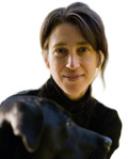

A cloud of ivy tendrils has appeared at the windowsill of my office in the last weeks, a sure sign of the advent of springtime weather here in New York City. So too are the guests on my windowsill: a mated pair of pigeons, sitting on a terrifically haphazard-looking nest of twigs, bits of plastic, and pigeon-deterrent wire.
Downtown at New York University, a red-tailed hawk pair made the clever but presumably uncalculated choice to make their nest on the sill outside the university president's office. The hawks, now christened Violet and Bobby, are raising one eyas (chick) under the watchful eye of a live-streaming video broadcast on the web. Depending on the hour, a few hundred to a few thousand people are watching Violet and her charge (4,152 as I write this, myself included), and the New York Times' city blog covers the news of the nest daily, and sometimes hourly.
This morning I watched a group of starlings loudly and fruitlessly mob another (possibly closely related) hawk in the local park who had grasped a young starling chick in his or her talons.
I am moved by the nature around me in the city. And I am moved by our divergent responses to this nature.
On the one hand, the hawks, native predators who have only recently returned to the city, are celebrated. And we have reason to celebrate them: they are large, impressive birds, even charismatic. When Violet developed a swollen leg -- ironically because of our (scientist's) interest in them, which led to her being banded -- a collective breath was held as it was determined how, or whether, to help. When the avian specialists consulted decided to let her be, one interested passerby described being pleased that "the little family" would be together. The first mated pair of red-tailed hawks seen regularly in the city were widely described as being "in love" -- a term that, I'd suggest, has rarely been used of the hundreds of thousands of pigeons who also live in the city and also mate for life.
Had "my" pigeons set up on the NYU president's windowsill, I doubt most of us, or the Times, would be watching every day. The city government treats pigeons to be pests; homeowners go to great expense to deter them from perching nearby. Nests are routinely destroyed. But the pigeons outside my window show great attention to -- fondness for? -- each other. They too preen each other, regurgitate food for their mates, dote on their young. When it rains, they sit or stand barely a wing apart, protectively fluffed to keep warm and dry.
And what of the starlings which lost a chick to a hawk? They are disliked for being a nonnative species, introduced intentionally in an attempt to bring Shakespeare's birds to the city. But if it were a golden-winged warbler, a rare visitor to these urban climes, chasing that nest-pillaging hawk, we would be chagrined at the loss.
The predatory hawk has become an underdog; the highly flexible and adaptive pigeon is punished for its success. The iridescent starling is unbeautiful to us because it is an immigrant; the flame-topped golden-wing warbler is beautiful because it is a migrant.
Instead, I celebrate all: the hawk and the pigeon raising their young; and the starling protecting theirs. I realize the impossibility of routing for each equally. Success for the starlings would mean one less meal for the hawk; success for the hawk would mean perhaps the squab that my pigeons are brooding would be dinner. The contradiction I embody is not a discrimination for or against any one animal; instead, it is an unwavering admiration for them all.

